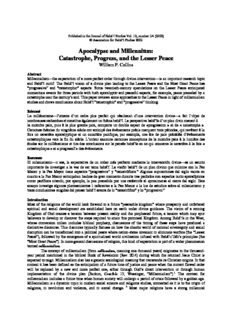
Apocalypse and Millennium PDF
Preview Apocalypse and Millennium
Published in the Journal of Bahá’í Studies Vol. 12, number 1/4 (2002) © Association for Bahá’í Studies 2002 Apocalypse and Millennium: Catastrophe, Progress, and the Lesser Peace William P. Collins Abstract Millennialism—the expectation of a more perfect order through divine intervention—is an important research topic and Bahá’í motif. The Bahá’í vision of a divine plan leading to the Lesser Peace and the Most Great Peace has “progressive” and “catastrophic” aspects. Some twentieth-century speculations on the Lesser Peace anticipated momentous events for three periods with both apocalyptic and peaceful aspects, for example, peace preceded by a catastrophe near the century’s end. This paper reviews some approaches to the Lesser Peace in light of millennialism studies and draws conclusions about Bahá’í “catastrophic” and “progressive” thinking. Résumé Le millénarisme—l’attente d’un ordre plus parfait qui résulterait d’une intervention divine—a fait l’objet de nombreuses recherches et constitue également un thème bahá’í. La perspective bahá’íe d’un plan divin menant à la moindre paix, puis à la plus grande paix, comporte un double aspect de «progression » et de « catastrophe ». Certaines théories du vingtième siècle ont anticipé des événements précis marquant trois périodes, qui revêtent à la fois un caractère apocalyptique et un caractère pacifique, par exemple, une ère de paix précédée d’événements catastrophiques vers la fin du siècle. L’auteur examine certaines conceptions de la moindre paix à la lumière des études sur le millénarisme et tire des conclusions sur la pensée bahá’íe en ce qui concerne le caractère à la fois « catastrophique » et « progressif » des événements. Resumen El mileniarismo—o sea, la expectativa de un orden más perfecto mediante la intervención divina—es un asunto importante de investigar a la vez de ser tema bahá’í. La visión bahá’í de un plan divino que culmine con la Paz Menor y la Paz Mayor tiene aspectos “progresivos” y “catastróficos.” Algunas suposiciones del siglo veinte en cuanto a la Paz Menor anticipaban hechos de gran momento durante tres períodos con aspectos tanto apocalípticos como pacíficos citando, por ejemplo, la paz precedida por una catástrofe al aproximarse el cierre del siglo. Este ensayo investiga algunos planteamientos 1 referentes a la Paz Menor a la luz de estudios sobre el mileniarismo y traza conclusiones surgidas del pensar bahá’í acerca de lo “catastrófico” y lo “progresivo.” Introduction Most of the religions of the world look forward to a future “peaceable kingdom” where prosperity and unfettered spiritual and social development are established here on earth under divine guidance. The vision of a coming Kingdom of God creates a tension between present reality and the prophesied future, a tension which may spur believers to develop or discover the steps required to attain this promised Kingdom. Among Bahá’ís in the West, whose conversion milieu includes biblical prophecy, discussions of the timing of these steps have produced a distinctive discourse. This discourse typically focuses on how the chaotic world of national sovereignty and social disruption can be transformed into a political peace where nation-states covenant to eliminate warfare (the “Lesser Peace”), followed by the emergence of a spiritualized world civilization infused with Bahá’u’lláh’s principles (the “Most Great Peace”). In more general discussions of religion, this kind of expectation is part of a wider phenomenon termed millennialism. The concept of millennialism (from millennium, meaning one thousand years) originates in the thousand- year period mentioned in the biblical Book of Revelation (Rev. 20:4) during which the returned Jesus Christ is expected to reign. Millennialism also has a generic sociological meaning that transcends its Christian origins. In that context it has been defined as the anticipation of a future time of justice and peace when the current flawed order will be replaced by a new and more perfect one, either through God’s direct intervention or through human implementation of the divine plan (Barkun, Crucible 13; Wessinger, “Millennialism”).1 The context for millennialism includes a future time when human society will undergo a period of crisis followed by a golden age. Millennialism is a dynamic topic in modern social science and religious studies, connected as it is to the origin of religions, to revolution and violence, and to social change. 2 Most major religions have a strong millennial
Description: